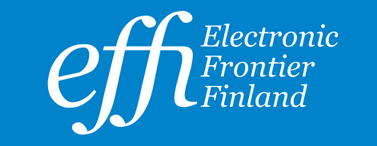Press release
For immediate release
Helsinki 22.10.2014
Effi: On Friday it will be weighed whom MPs listen to regarding copyrights
Electronic Frontier Finland is enthusiastic that the Parliament will vote on the Citizens’ Initiative for Common Sense for Copyright Act. Member of Parliament Elina Lepomäki (National Coalition party) made a counter proposal today with Member of Parliament Jukka Kopra (National Coalition party) in response to the proposal of the Committee for Education and Culture to reject the citizens’ initiative in its entirety. Lepomäki’s and Kopra’s proposal raises three specific points from the initiative: To enable innovative online storage services by defining these as private use, to add much stronger exceptions for education and research in the digital era, and to the balance the composition of the assembly of the Council for Copyrights. The counter proposal will be discussed on Thursday, and voted on in Friday’s plenary session at 13:00 EET.
Vice Chairman of Effi Ville Oksanen says: “The Parliament will now have to make a concrete decision on whether it listens to the copyright industry lobbyists or to ordinary citizens who have expressed their desire to make the copyright law fairer and more just for the society.” Oksanen continues: “We knew to expect a knock-out from the Committee for Education and Culture, as the Committee has systematically sided with the copyright industry lobby in the past. Now we are happy to hear what the whole Parliament has to say on the matter.”
Effi points out that in connection to the so called Lex Karpela, a majority of the Parliament walked over the Committee for Education and Culture’s position. In this case the Committee for Education and Culture would have preferred to make churches pay Teosto for singing hymns.
Oksanen concludes: “In the next two days, we will see an unprecedented lobbying wave against Lepomäki and Kopra from the industry professional lobby, Teosto’s dedicated lobbying artists and other similar organisations that benefit from the status quo. But in Effi we hope that this is balanced by ordinary citizens scrambling to activate their own MPs – it is finally time to get some Common Sense into the copyright law!”
Lepomäki sees the counter initiative as a means to regain power for the civil society. “The artificial confrontation between authors, artists and users needs to come to its end. The current law benefits different middle-men the most,” she states.
The full text of the initiative:
Lepomäki’s proposal includes the following parts:
Section 12(2) (Network-attached storage)
The wording of section 12(2) of the Copyright Act is proposed to be amended as follows: “It is also permitted to have copies made by a third party for the private use of the party ordering the copies. Private use also includes saving works in online services managed by the user, but maintained by third parties.” The wording of the subsection in force is as follows: “It is also permitted to have copies made by a third party for the private use of the party ordering the copies.”
Section 14(2) (Use for teaching and research)
The bill proposes to add a new subsection 2 to section 14 that would read as follows:
“Teaching activity in a classroom or in a similar space is not considered public use of works. The use of works created for other purposes than teaching or research is permitted for the purposes of teaching or research, notwithstanding the provisions of section 2.”
Section 55(1) (The composition of the Copyright Council)
The wording of section 55(1) of the Copyright Act is proposed to be amended as follows: “The Government shall appoint a Copyright Council to assist the Ministry of Education in the handling of copyright matters and to issue statements regarding the application of this Act. The council shall include a balanced representation of authors, commercial users of works, educational organizations, and the representatives of consumers. The council must use the best scientific research data in the field as support for its decisions.”
Section 56a(5) (Decriminalization of use for teaching and research)
The wording of section 56a(5) of the Copyright Act is proposed to be amended as follows: “The making of a few copies for private use of a computer-readable computer program or a database which has been published or copies of which have been sold or otherwise permanently transferred with the consent of the author, or the making of a few copies for private use of a work contrary to section 11(5) shall not be considered to constitute copyright violation. Actions contrary to this Act that occur for the non-commercial purpose of teaching or research shall also not be considered to constitute copyright violation.”
